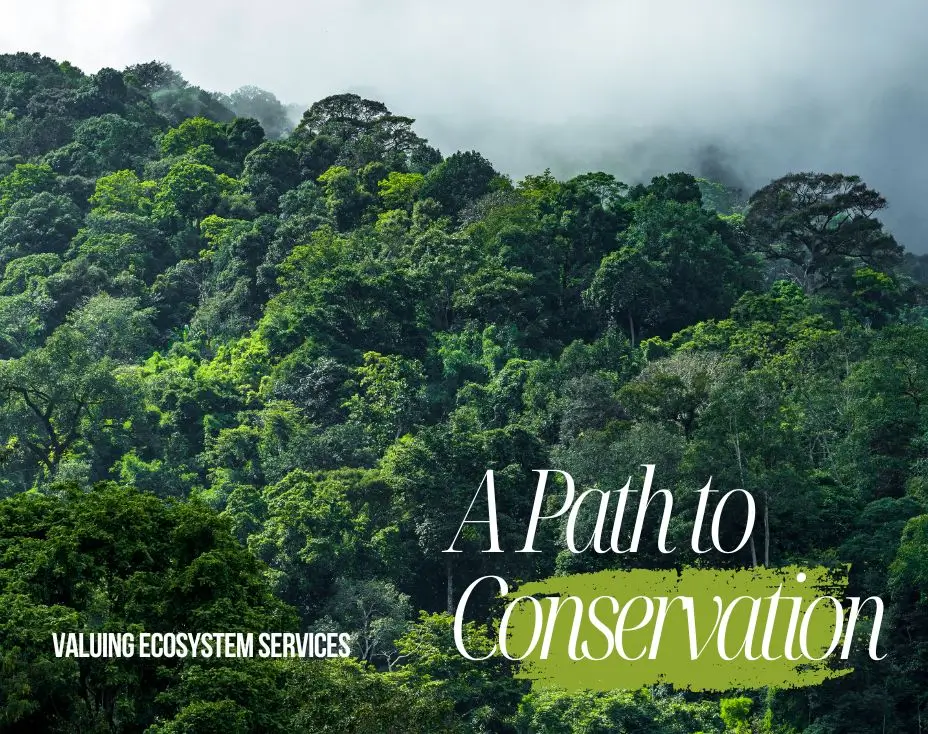Valuing Ecosystem Services: Economic Implications and Their Role in Conservation Strategies
The valuation of ecosystem services (ES) has become a critical aspect of environmental economics, particularly as societies grapple with the challenges of biodiversity loss, climate change, and resource depletion. Ecosystem services refer to the benefits that humans derive from natural ecosystems, including provisioning services (such as food and water), regulating services (such as climate regulation and flood control), cultural services (such as recreation), and supporting services (such as nutrient cycling). Understanding the economic implications of these services is essential for informing conservation strategies and sustainable management practices.

The Importance of Ecosystem Service Valuation
Ecosystem service valuation provides a framework for recognizing the economic contributions of natural environments to human well-being. According to Costanza et al. (2014), the total global value of ecosystem services is estimated to be approximately $125 trillion per year in 2011, highlighting their immense economic importance. This valuation underscores the need to integrate ecological health into economic decision-making processes. By quantifying the benefits provided by ecosystems, policymakers can better assess the trade-offs associated with land-use change, resource extraction, and conservation efforts.
Economic valuation methods can be broadly categorized into two groups: revealed preference and stated preference. Revealed preference methods are based on actual market behavior related to ecosystem goods and services, while stated preference methods rely on surveys to determine individuals’ willingness to pay for specific ecosystem services in hypothetical scenarios (Velasco-Muñoz, 2022). Common techniques include the travel cost method, which estimates the value of recreational sites by assessing how much people are willing to spend to visit them, and the contingent valuation method, which directly asks individuals how much they would be willing to pay for specific environmental improvements.
Economic Implications of Ecosystem Service Valuation
The economic implications of valuing ecosystem services are profound. By incorporating ecosystem values into national accounting systems, governments can better reflect the true wealth of their nations. For example, the System of Environmental-Economic Accounting (SEEA) framework developed by the United Nations provides guidelines for integrating environmental data into economic statistics, allowing countries to account for natural capital alongside traditional economic indicators (SEEA, 2021). This approach not only improves policy coherence but also promotes sustainable development by highlighting the importance of conserving natural resources.
In addition, valuation studies can inform conservation strategies by identifying priority areas for protection based on their economic value. By quantifying benefits, policymakers have been able to justify investments in conservation initiatives that protect vital ecosystems.
Challenges in Valuing Ecosystem Services
Despite its importance, the valuation of ecosystem services presents several challenges. One major issue is the difficulty of capturing the non-market values associated with many ecosystem services. For example, cultural and spiritual values associated with natural landscapes are often overlooked in traditional economic valuations. There is also a risk of commodifying nature by reducing complex ecological functions to monetary values that may not fully capture their intrinsic value or cultural significance (WetlandInfo, 2024).
There is also considerable variability in valuation methods and results across different contexts. A meta-analysis of valuation studies found significant discrepancies in estimated values due to differences in methodology, geographic location, and ecosystem type (Velasco-Muñoz, 2022). This variability complicates efforts to establish standardized approaches to ecosystem service valuation and may hinder comparability across studies.
Why It Matters for Ecobal
At Ecobal, we are committed to staying at the forefront of technological advancements in CO2 sequestration. By integrating cutting-edge technologies such as ultra-fast CO2 hydrate formation, we enhance our efforts to transform former agricultural or barren lands into thriving ecosystems.
Ecobal has achieved significant milestones, including:
- Nature Spots in five different EU countries: France, Italy, Poland, Spain, and Romania.
- Ecobal’s storage capacity: Managing 155 hectares of Nature Spots across the EU, storing 1581 tons of CO2 and releasing about 1150 tons of oxygen per year.
This ensures that our projects not only effectively sequester CO2 but also contribute to sustainable biodiversity conservation.
Ecobal’s Mission:
- Raise awareness and establish authority to certify the ecological health and capacity of rural and natural landscapes.
- Monetize ecosystem services to demonstrate the economic value of nature.
- Use natural ecosystems as efficient carbon sinks for CH4 and CO2 sequestration and biodiversity conservation.
- Turn CO2 and CH4 from a challenge into valuable and tradable commodities.
- Manage soil microbiota and fauna to improve soil health and ecosystem functionality.
- Restore biodiversity through the reintroduction and conservation of native species.
In Conclusion
Valuing ecosystem services is essential for understanding their economic implications and for developing effective conservation strategies. By quantifying the benefits derived from ecosystems, policymakers can make more informed decisions that balance development needs with environmental protection. While challenges remain in accurately capturing non-market values and establishing standardized methodologies, ongoing research and advances in valuation techniques hold promise for improving our understanding of the contributions of ecosystem services to human well-being. Ultimately, integrating the valuation of ecosystem services into decision-making processes will be critical for promoting sustainable management practices and ensuring the long-term health of our natural environments.
About the Author
This article is written by Dr. Amisalu Milkias, Ecobal’s CO₂ Project Specialist, dedicated to advancing sustainable conservation strategies through ecosystem service valuation.
Selected Sources
- Costanza, R., et al. (2014). Changes in the Global Value of Ecosystem Services. Global Environmental Change, 26(1), 152-158.
- SEEA (2021). System of Environmental-Economic Accounting: Central Framework.
- Velasco-Muñoz, J.F. (2022). The Economic Valuation of Ecosystem Services: A Bibliometric Analysis.
- WetlandInfo (2024). Economic Valuation of Ecosystem Services.


